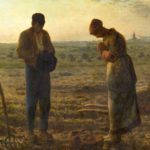Whittaker Chambers refused to call himself a conservative.
In his letters to William F. Buckley, the ex-communist turned informer often expressed discomfort with the new orthodoxy National Review was forging. In a missive dated Christmas Eve, 1958, for instance, Chambers declared he had “almost nothing in common” with either the fusionist Frank Meyer or the traditionalist Russell Kirk. What’s more, he considered their debate “an irrelevant buzz.” Men with a disposition to preserve, Chambers believed, did not grasp the “total reality” of the Cold War crisis America faced.
Chambers preferred to identify as a “man of the Right” or a “counter-revolutionary.” “We are in the middle of a universal earthquake,” he wrote to Buckley. “If we survive it, then there will be something to reflect on. It is perfectly clear that we may not survive. At that point, I lose interest.” The West faced an existential crisis, and Chambers wanted to direct all its efforts to overcoming revolutionary ideology.
Chambers’s discontent with “movement conservatism” would probably resonate with many on the Right today. The old fusionist formulas have lost their luster, and young people especially are seeking “postliberal” solutions to the problems of a modern society. As the crisis heightens, conservatism just does not seem to be enough. Chambers, however, was perhaps more genuinely conservative than his correspondence with Buckley suggests. Especially with regard to his farm, rural life, and his neighbors, his writing exhibits a deeply conservative streak that tempered his counterrevolutionary zeal. Modern politics may be an existential struggle between freedom and tyranny, but the local provided Chambers a shelter against the gale of revolution.
Start your day with Public Discourse
Sign up and get our daily essays sent straight to your inbox.The Existential Struggle
Chambers was initially attracted to communism because he had lost confidence in the West. A troubled childhood—his parents’ marriage was messy and his brother committed suicide—left him with a deep sense of the injustices plaguing American society. As he put it in his memoir, Witness, communism “offered me what nothing else in the dying world had power to offer at the same intensity, faith and a vision, something for which to live and something for which to die.” He wanted to become an agent of the Revolution. In college, Chambers toyed with various left-wing student groups, especially Fabian socialism, but none of these felt sufficiently radical to him. Eventually, he discovered Vladimir Lenin and the Communist Party of the United States.
“The Communist Party presents itself as the one organization of the will to survive the crisis in a civilization where that will is elsewhere divided, wavering, or absent,” he wrote. “The revolution is never stronger than the failure of civilization. Communism is never stronger than the failure of other faiths.”
Initially, he worked as a propagandist for the far Left, but leaders within the Soviet underground recognized his fervent devotion to the cause and recruited him for spy work. Chambers became a sort of courier between the USSR’s State Political Directorate and Soviet agents within the American government. He helped New Deal politicos and bureaucrats with Marxist sympathies, such as Harold Ware and Alger Hiss, smuggle intelligence back to the authorities in Moscow.
As Joseph Stalin’s brutality intensified, however, Chambers became more and more uncomfortable with communist ideology. First, the mass executions of the purges and the desperate conditions of the gulag camps filled him with disgust. Then, the Molotov-Ribbentrop Pact between Nazi Germany and Stalinist Russia revealed the extent to which fascism and communism were simply two different names for the same revolutionary barbarism. Revolution, Chambers realized, could not ameliorate human suffering—it only caused even more. At great personal cost, he finally abandoned the Communist Party. Hounded by Soviet agents for the rest of his life, and plagued by an unending sense that he had somehow betrayed his old Party friends, Chambers never quite found real peace.
The Counterrevolutionary Critique of Conservatism
Walter Krivitsky, a high-ranking Soviet spymaster who defected before Chambers, became one of his most important mentors. Before his assassination at the hands of Soviet agents, Krivitsky encouraged Chambers to turn informer. The most important political task, he believed, was sounding the alarm about communist infiltration in the West. Most Americans simply did not understand the scale of Soviet infiltration. The New Deal, Chambers saw, had swept a cadre of communists, such as Hiss, labor attorney Lee Pressman, and their liberal fellow travelers into power—power that they were using to advance Soviet interests.
One of the barriers to an effective response to the Soviet threat, however, was conservatism itself. In Witness, Chambers writes that Krivitsky taught him:
Counterrevolution and conservatism have little in common. In the struggle against Communism the conservative is all but helpless. For that struggle cannot be fought, much less won, or even understood, except in terms of total sacrifice. And the conservative is suspicious of sacrifice; he wishes first to conserve, above all what he is and what he has. You cannot fight against revolutions so.
Too many conservatives simply did not understand the stakes. Chambers came to believe that ideology challenged freedom on every possible front, from the geopolitical to the philosophic. “For scale, complexity, and depth, the struggle between Communism and the West,” he wrote in the posthumously published Cold Friday, “is a conflict without any precedent of human record.”
Communism undermined every premise of Western civilization, from the rule of law and property rights to belief in a transcendent moral order and God himself. Chambers wrote Witness to plant a counterrevolutionary seed among conservatives. As he exposed Hiss and other New Dealers’ ties to the Communist Party, Chambers became a cause célèbre for the American Right. But he was never perfectly at ease with his place among conservatives.
Buckley invited him to join National Review as an editor at its founding in 1955, but Chambers demurred for both health and political reasons. His time in the Communist Party made Chambers wary of all forms of “political orthodoxy,” including the conservative doctrines Buckley and his colleagues were beginning to express. Chambers eventually did agree to join the magazine, but his tenure was brief and somewhat rocky.
In the end, Chambers always felt that conservatism was too inflexible a position. It was incapable of dealing with the radical political situation posed by the Soviet threat, and especially the threat of communists infiltrating American society.
There is something deeply conservative—perhaps even Platonic—about the agrarian dimension of Chambers’s thought.
“The Farm Was Your Kingdom”
There is more, however, to Chambers’s abandonment of communism than politics. Defection from communism also meant a rediscovery of God. At the same time that he was becoming disillusioned with the Soviet Union and even the idea of revolution, Chambers began to embrace Christianity as the ultimate expression of human freedom.
Chambers and his wife Esther had two children, Ellen and John. They were born while the family was a part of the Soviet underground, but after leaving the party Chambers desperately wanted to ensure that the family would not sink back into ideology. He therefore believed that his children needed to experience “the wonder of life and the wonder of the universe . . . not from books, not from lectures, but simply from living among them.” The best way he thought he could do this was by raising them in the countryside.
The Chamberses bought several acres outside of Westminster, Maryland, a few miles away from the Gettysburg battlefield. They named it “Pipe Creek Farm.” The farm became a sort of metaphor for the existential struggles Chambers experienced in his own soul and saw in the apocalyptic confrontation between communism and the West. “Those who suppose that farming is an idyllic business should learn that it is blood, sweat, tears, accidents, sudden, and sometimes lingering, death. This will defeat only those who do not know that life is rooted in horror as every field of springing grain is dunged with filth and death,” he wrote in an April 16, 1957, letter to Buckley. “We have learned wonderfully how to upholster sacrifice and insulate ourselves against its reality. I am not sure we are the better for it.”
There is something deeply conservative—perhaps even Platonic—about this agrarian dimension of Chambers’s thought. In his Reflections on the Revolution in France, Edmund Burke, the founder of conservatism, said that society is an eternal contract, “linking the lower with the higher natures, connecting the visible and invisible world, according to a fixed compact sanctioned by the inviolable oath which holds all physical and all moral natures each in their appointed place.” For Chambers and his family, Pipe Creek Farm became one of these spiritual links between the high and the low, the visible and the invisible, the living and the dead.
In Witness, Chambers goes on to use religious language to describe what he loves about Pipe Creek Farm. It is a kind of family altar. “To it each day we bring our faith, our love for one another as a family, our working hands, our prayers. In its soil and the care of its creatures, we bury each day a part of our lives in the form of labor,” he said. “The yield of our daily dying, from which each night in part restores us, springs around us in the seasons of harvest, in the produce of animals, in incalculable content.”
Much like his writing, then, Chambers intended the farm to stand as a witness—specifically, “a witness against the world.” “By deliberately choosing this life of hardship and immense satisfaction, we say in effect: The modern world has nothing better to give us.” Such a witness may be “unrealistic,” Chambers said, with the crush of modern forces and mass effects weighing down on his family. But it was no less necessary.
The chief characteristic of political modernity, according to Chambers, is a materialist rejection of the divine source of human life. The communist and the liberal alike believed in the triumph of faith in Man against faith in God. Farm life matters because the chosen suffering it requires, Chambers declared in Cold Friday, stands “not only against the forces of open revolution but also against that suffocating materialism, which, more than hunger or want, recruits the forces of revolution in the West.”
Rooted in the Nation
Chambers’s agrarianism was also a way to express a kind of populist solidarity with the American people. “But we did not mean only to root our children in the soil. Above all, we meant to root them in the nation—that part of the nation each of whose days is a great creative labor,” Chambers wrote in Witness. “That is the part of the nation to which by choice I belong. The farm is the soil, in which, like my children, I spread my roots.”
Chambers often observed that most of his supporters “came from the wrong side of the railroad tracks.” The Hiss case “did not so much open as reveal” a “jagged fissure . . . between the plain men and women of the nation, and those who affected to act, think, and speak for them.” The laboring classes that communism supposedly aimed to uplift rejected it out of hand.
Chambers had an immense faith in the power of labor. Americans, he insisted, are “free not to stay on the wrong side of the railroad tracks.” America is a wonder and a hope for Chambers because here, “If within us there was something that empowered us to grow, we were free to grow and go where we could.” Yet labor does not enable growth without limits. “We were not free ever to forget, ever to despise our origins,” Chambers went on to say. “They were our roots. They made us a nation.”
And it is this sense of rooted nationality that gave Chambers great strength and confidence in the darkest hours of the Hiss case:
But even when they did not understand, my people were always about me. I had only look around me to see them—on the farms, on the streets, in homes, in shops, in the day coaches of trains. My people, humble people, strong in common sense, in common goodness, in common forgiveness, because all felt bowed together under the common weight of life.
This patriotic impulse toward rootedness is perhaps Chambers’s most conservative instinct. In The Conservative Mind, for instance, Russell Kirk observed that “if the need of the eighteenth century was for emancipation, the need of the twentieth is for roots.” Chambers, like Kirk and other conservatives, fundamentally affirmed the American way of life. Political action, then, was necessary for more than defeating communism—it was necessary for defending a nation conservatives love.
Chambers’s Agrarianism and Conservative Political Action
One of Chambers’s best essays for National Review, a 1958 piece titled “Springhead to Springhead,” later collected in Ghosts on the Roof, demonstrates how these agrarian commitments can translate to conservative political action. In it, he reports on his neighbor farmers’ resistance to supply controls imposed by federal Department of Agriculture bureaucrats.
By refusing to obey the government agents, Chambers said, the farmers were taking a stand for property rights—one of the most basic principles of the American regime. “That principle is the inviolability of a man’s land from invasion even by the State, the right of a man to grow for his own use (unpenalized by the State) a harvest which his labor and skill wrings from the earth, and which could not otherwise exist,” he wrote. Nothing less than freedom was at stake.
Rejecting wheat allotments became a symbol of a larger fight for a way of life. Someday, looking back through time, Chambers writes, the memory of this action may “remind [us] of a continuity that outlives all lives, fears, perplexities, contrivings, hopes, defeats; so that he is moved to reach down and touch again for strength, as if he were its first discoverer, the changeless thing—the undeluding, undenying earth.” Thus, it was the conservative object of the farmers’ resistance that Chambers admired.
Conservative political action—that is to say, a politics aimed first and foremost at cultivating our roots and preserving the constitution of things—can, in fact, be a bulwark of counterrevolution. This is why Whittaker Chambers was a “conservative of the heart,” even if he did not consider himself a “conservative of the head.” In the final analysis, he was a witness to the permanent things.
This essay is adapted from remarks delivered at the 2024 Ciceronian Society Conference.
Image by maksymowicz and licensed via Adobe Stock.














